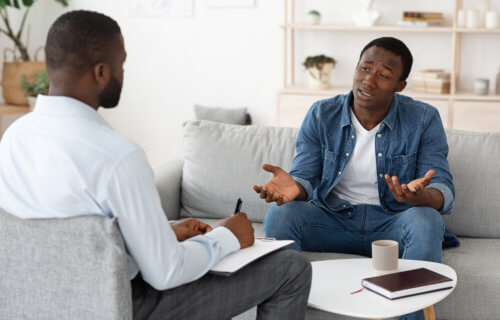NEW YORK — From health to the economy, it’s no secret 2020 will go down as one of the most stressful years in recent memory for people around the world. So just how difficult was 2020? Enough that more than one in every six Americans entered therapy for the first time, according to a new survey.
A OnePoll study of 2,000 adults reveals these new patients joined the 31 percent of Americans who either continued or returned to therapy during the last year. Researchers find 15 percent also began taking medication for mental health issues for the first time in 2020. Another 15 percent changed or increased their prescription dosages during the pandemic.
There’s still a stigma about therapy
Despite the surge in Americans asking for help, the poll finds there’s still a negative perception about going to therapy. Forty-seven percent believe that entering therapy is a sign of weakness. The survey, commissioned by Vida Health, does note that just a quarter of respondents (27%) have never visited a therapist in their lifetime.
Three in 10 people who are not in therapy say it’s because they don’t believe their problems are “big enough” to need professional help. Another 32 percent say they can “handle their problems on their own.”
“Americans often place other priorities above their own mental health needs, not just because of stigma but because of time,” says Vida Health’s Chief Clinical Officer Dr. Chris Mosunic in a statement. “They often see work, home and social responsibilities as being more important than their personal health and well-being. But just as they tell you on airplanes when the oxygen masks come down, we can’t help others if we don’t take care ourselves first.”
COVID-19 and winter make for mental health misery
As you might expect, the coronavirus pandemic was a major reason why Americans are now seeking a therapist’s help for their issues. Forty-five percent of respondents say they considered seeking treatment due to COVID-19. Just 15 percent of Americans think the pandemic did not damage their mental health.
Entering 2021, the winter weather is now adding to the problems of many people. Over six in 10 adults (62%) say they feel more depressed during the winter months. One in three (32%) call winter the worst season for their mental health.
Still, certain groups continue to avoid finding someone to help them deal with their troubles. The poll says men (35%), residents from the Midwest (53%), and baby boomers over 65 (74%) are most likely to never try therapy. Surprisingly, only 10 percent of baby boomers call going to therapy a sign of weakness, despite not trying it themselves.
“Many people don’t feel comfortable with therapy for a variety of reasons,” Dr. Mosunic notes. “While cognitive behavioral therapy is the fastest path towards relieving moderate anxiety or depression, there are still plenty of other ways to improve your mental health. Some of the self-help tools I often suggest are having a daily exercise routine, improving your sleep health and incorporating some mindfulness-based stress reduction techniques, like breathing exercises or a ‘body scan.’”
Common symptoms
Regardless of whether a respondent entered therapy or not, the survey finds 88 percent experienced at least one symptom health professionals link to mental health trauma. Those include having “little interest or pleasure in doing things” (52%), “having trouble falling or staying asleep” (52%), and “feeling down, depressed or hopeless” (51%).
For Americans in 2020, these problems were the worst in the months of April and May. Three in 10 respondents say their mental health was at its lowest in these two months, right as the pandemic began.
“The bottom line is that there are many ways to improve your mental well being,” Mosunic adds. “You just have to choose a path you feel comfortable with and can take ownership of.”
